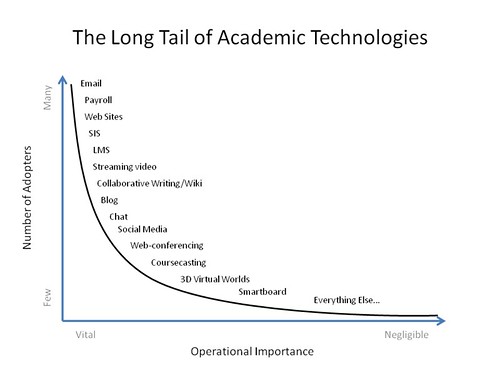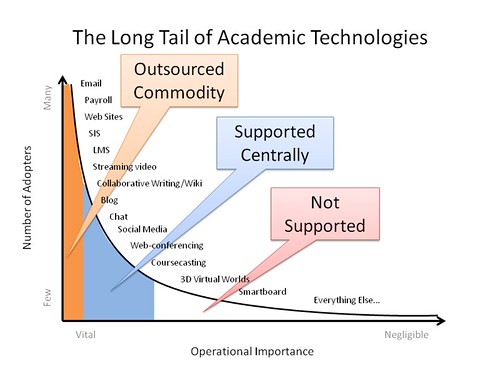This post has been inspired by a lot of different sources and event. As some of you know, I'm the Sakai Project Leader at my higher education institution. And as most of you know, I'm a huge social media and web 2.0 junkie.
But something has started to bug me a while ago. It seems to me that as time goes by and that we become more engaged with web 2.0 technologies in our everyday lives, more and more workers are shifting their attention away from centrally supported IT systems to really take advantage of free web services. And who can blame them, I do exactly the same thing myself:
- I use Evernote for all my meetings and to dos.
- I use Dropbox to keep current files at hand.
- I use Diigo and Delicious for my bookmarks.
- I publish blog posts here, in addition to my professional blog that I just started a couple of months ago.
- I publish pics on Flickr and videos on Youtube.
- And many more...
Numerous studies show that social media is here to stay and make people more productive. See
The Cost of Social Media Phobia and
Millennials will make online sharing in networks a lifelong habit.
There is most certainly some good and some bad in this, as described by Michael Zimmer and Bruce Maas in their Educause Live Webinar called "
What Do Newer Generation Faculty Want from IT Services?" But good or bad, the shift is happening, and how central IT units will react will determine if workers will continue to see us as problem solvers instead of red tape addicts.
My Understanding of What's Happening
I think that the
Long Tail model, as made popular by Chris Anderson, is a good way to visualize my take on this. First, here's a very loose representation of what I believe are the most commonly encountered technologies in higher education institutions.

Now, traditionally, central IT has supported the most commonly used technologies, which is the right thing to do.

As more technologies become available, and as computing power and bandwidth become better and cheaper thanks to Moore's Law, some very common technologies are becoming very common.

Under the new digital economy, some vital services have become commodities, i.e. they can be outsourced for a fraction of the cost of supporting them internally. It's happening right now with
email (e.i., Microsoft Live, Google Apps), and there is no reason to think it's not going to happen to other technologies as well. The newly liberated central IT time can be allocated at supporting technologies that have some potential for widespread adoption further down the tail.
George Siemens, in his excellent post called "
Well Played, Blackboard", explains how this company's survival is down the tail. By acquiring Elluminate and Wimba, they have gained access to a niche market that still has potential for growth, as the traditional LMS features are becoming more of a commodity.
What Does This Means?
I think that what this means is that higher education institutions will have to revisit their old ways of supporting technologies to figure out what is obsolete and find new ways to leverage internal resources. Educators are becoming more web-savvy and will drift their own way if we can't offer something that has value to support academic work and make our institutions special.
This can also be applied at a macro-level, as discussed during my
session at the Sakai conference in Denver last June. The Sakai community has to focus on what adds value to the institution, and integrate with emerging technologies instead of trying to compete, because that's just an ever losing battle.



